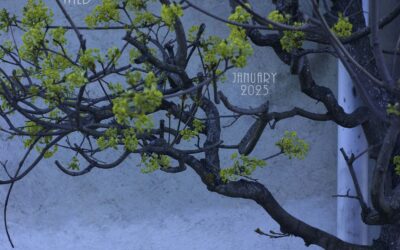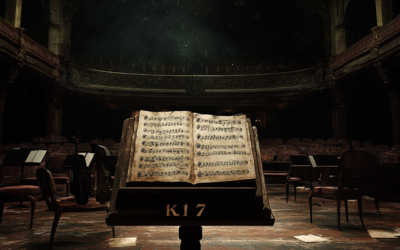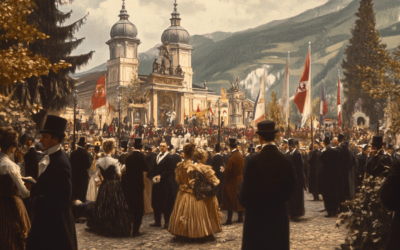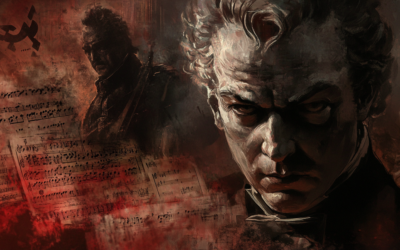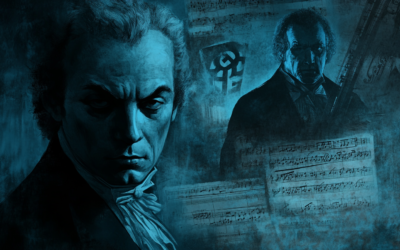Mozart Unveiled on Radio Vaticana:
A Landmark Broadcast
Experience the power of critical musicology as Luca Bianchini and Anna Trombetta present their groundbreaking insights on Mozart’s legacy on the prestigious Radio Vaticana.
Each episode unveils secrets and challenges the myths surrounding this celebrated composer.
Mozart: The Fall of the Gods
This book compiles the results of our studies on 18th-century music and Mozart, who has been revered for over two centuries as a deity. We dismantle the baseless cult of Mozart and strip away the clichés that falsely present him as a natural genius, revealing the contradictions in conventional biographies. In this work, divided into two parts, we identify and critically analyze several contradictory points in the vast Mozart bibliography. Each of the nearly 2,000 citations is meticulously sourced, allowing readers to verify the findings. This critical biography of Mozart emerges from these premises, addressing the numerous doubts raised by researchers.
"Mozart is not what history wants us to believe—sometimes, the truth is stranger than the myth."
Mozart: The Fall of the Gods
e esteemed musicologists Luca Bianchini and Anna Trombetta are bringing their provocative insights on Mozart to none other than Radio Vaticana, the Vatican’s highly revered station. Through a series of enlightening episodes of L’Arpeggio, Bianchini and Trombetta will delve into the myth surrounding Mozart, revealing intricate details from their groundbreaking book, Mozart: The Fall of the Gods. In a truly prestigious event, Radio Vaticana honors these scholars’ in-depth research and fearless questioning of Mozart’s legacy, underscoring the importance of evidence-based musicology in the modern world.
A Closer Look: The Episodes
First Episode
Introduction – The Birth of the Mozart Myth
Watch here: YouTube
Second Episode
The Quartets
Watch here: YouTube
Third Episode
The Duets and Quintets
Watch here: YouTube
Fourth Episode
Theater Director and The Marriage of Figaro
Watch here: YouTube
Fifth Episode
Divertimento K. 522
Watch here: YouTube
These first ten episodes explore key works of Mozart, presenting a rare, detailed critique that challenges the unexamined adulation Mozart often receives. From operas to quartets, this series promises to illuminate and unsettle long-held assumptions.
Special Feature: The Magic Flute
Explore more about Mozart’s most enigmatic work, The Magic Flute, through exclusive audio and video.
Follow this unparalleled broadcast to uncover a new perspective on Mozart, backed by historical scrutiny and the primary sources that few dare to reveal.
You May Also Like
Constanze Mozart’s Enduring Love
Although some have doubted her devotion, Constanze’s own words and actions illustrate a widow deeply committed to preserving Mozart’s legacy. Diaries, personal correspondence, and eyewitness testimony all challenge the notion that she neglected his memory—while the circumstances around his burial grow ever more perplexing.
A Revealing New Interview on His Thematic Catalogue
We’re excited to present a brand-new interview that challenges many of the long-held assumptions about Mozart’s Thematic Catalogue (1784–1791). Conducted by Swedish journalist Henry Grynnsten, this conversation delves into groundbreaking forensic techniques—like advanced ink analysis and digital image processing—that may change the way we view Mozart’s late works.
The Rattling Symphony: A Critical Take on K. 17
Often attributed to Mozart, the K. 17 symphony is anything but refined. Lacking orchestration and filled with gaps, it raises more questions than answers about its true authorship.
The Hidden Origins of the Salzburg Festival: A Nationalist Dream
The Salzburg Festival, far from being a mere celebration of Mozart’s genius, was born out of nationalist ambitions during a turbulent period in Austro-German history. Conceived by figures like Max Reinhardt, Heinrich Damisch, and Friedrich Gehmacher, the festival was deeply rooted in ultranationalistic ideals, transforming Mozart’s legacy into a tool for cultural dominance. The truth behind its founding has long been obscured, but the primary sources tell a different, darker story.
Mozart, Wagner, and the Nazi Myth
The Führer’s admiration for Wagner’s racially charged ideology not only influenced the policies of the Nazi regime but also reshaped the legacy of Mozart. Under National Socialism, Mozart was not celebrated as a universal genius but as a symbol of German purity and superiority. His music, stripped of its international influence, was rebranded as an expression of Aryan identity, intended to unify and inspire the German people.
Mozart, the Anschluss, and Nazi Propaganda
Following the 1938 Anschluss, the Nazi regime rebranded Mozart as the quintessential German composer, using his image to promote unity between Austria and Germany. The Salzburg Festival became a platform for Nazi propaganda, distorting Mozart’s legacy to fit their nationalistic and racial agenda.



